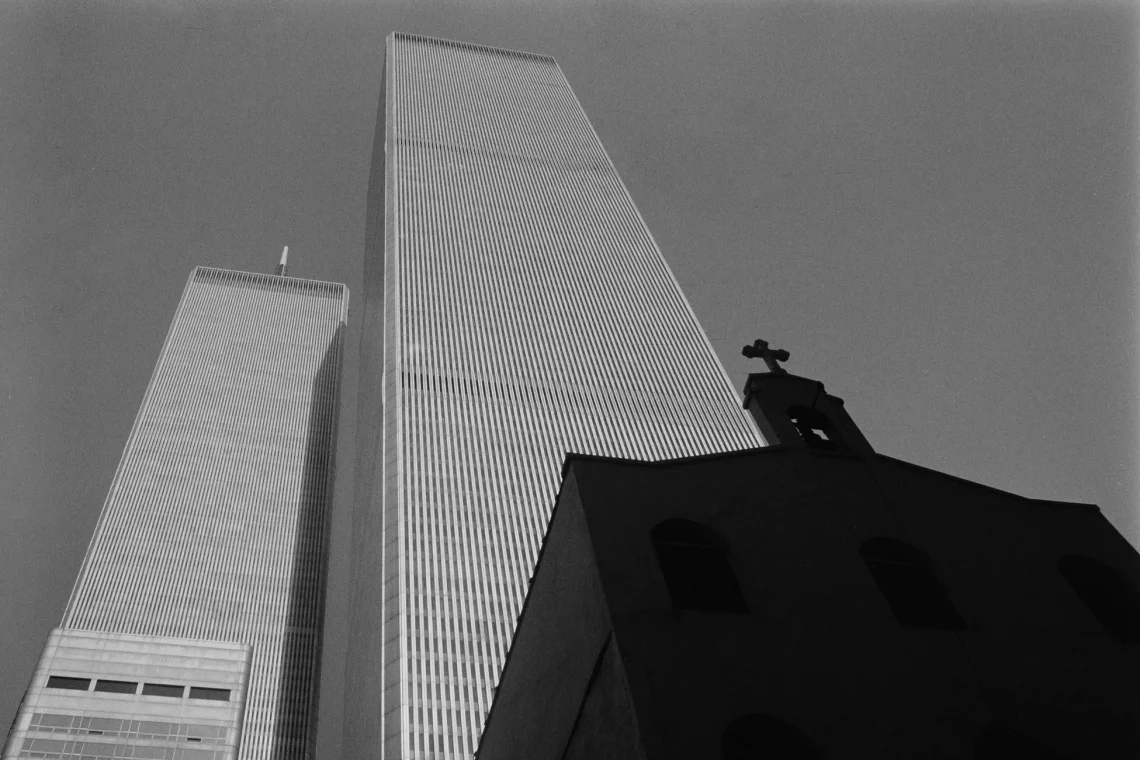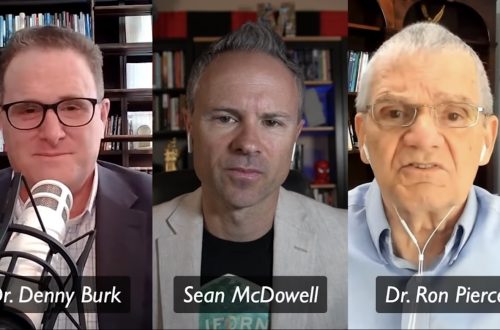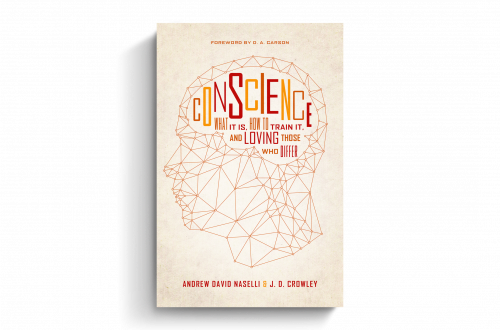I’ll never forget where I was on September 11, 2001. My wife and I were in our second year of marriage, and we were living in Louisville, Kentucky while I was working on my Ph.D. On the morning of the attacks, I had a seminar later that day, and I was in our apartment when she called me from her work to tell me to turn the television on. I think both buildings had already been struck by the time I tuned in, but I was watching live television as the towers eventually crumbled to the ground.
Americans were horrified by what we saw that day. As the flames engulfed the towers, it dawned on us the terrible choice our fellow countrymen in those towers faced—”Should I burn alive or jump?” We witnessed with our own eyes what they chose. We watched in real time as so many of them leapt to their deaths from the towers. For my generation, the “falling man” has been forever etched in our memory. We will never forget him.
Not only did we see the airplanes crashing and the flames smoldering. Even as we sat stunned looking at the two towers ablaze, we also received the ominous report that the Pentagon had been hit. That symbol of our national might and security was engulfed in flames. The meaning of that building being under direct attack was not lost on anyone. We thought, “They can attack us there? If they can hit the Pentagon, what can’t they hit?”
The emotion of that day has left an indelible mark on me. The uncertainty. The questions. The threat of a coming war with unidentified enemies. The horror of watching all those people die. The specter of gas shortages and economic collapse. As the buildings smoldered, we had no idea who was doing this to us, and we didn’t know what was coming next. We all felt like another attack was imminent. We were just waiting for the other shoe to drop. Los Angeles? Chicago? Atlanta? Surely it was coming.
For the first half of my teaching career, I shared this experience with my undergraduate students. We all went through it. We all remembered it. We all felt it. Over the last ten years, however, each new crop of students has yielded less memory of that day. Today, entering freshmen have no memory at all for they were all born after September 11, 2001. The 9/11 attacks are to them like the JFK assassination was to me when I was their age—a remote national calamity that my parents experienced but that I could hardly fathom. Every passing year is like a wave washing away the sands of our national memory.
And I think this is the part that bothers me the most. We have forgotten something that never should have slipped away from us. A proud nation that fancied itself as an impregnable fortress got humbled on that day. We found out that the homeland is not invulnerable. And we looked death in the face. For a moment, every person in America put aside the soul-crushing amusements that we normally busy ourselves with. There was a moment when America actually hit the pause button on its incessant celebrity worship.
Churches across the country filled up and overflowed on September 16, the Sunday after the attacks. There was a palpable national feeling that we needed to hear something weighty and true to make sense of it all. And millions of Americans who never go to church went to church that day. And yet as a nation, we seem to have forgotten all this. What should have changed our national life didn’t—at least not permanently. As the horror faded, so also did our resolve to deal seriously with sin, righteousness, and judgment. The nation got back to its idolatries soon enough. Lord, have mercy on us.
My wife and I went to hear Tom Schreiner preach on September 16, 2001. His text was Luke 13:
“Or do you suppose that those eighteen on whom the tower in Siloam fell and killed them, were worse culprits than all the men who live in Jerusalem? I tell you, no, but unless you repent, you will all likewise perish.” –Luke 13:4-5
Could there be a more appropriate text for that day? I doubt it. Here we have a tower falling on and killing eighteen people. What is the lesson from the falling tower? We are no better than the people that perished in those towers. Indeed, if we fail to repent, we can expect an even worse judgment than those upon whom the tower of Siloam fell.
The message of the moment for everyone was this. Look death in the face, and contemplate what this means for your own life. Your life is short. It may end sooner than you think. Repent and turn to Christ as your only hope in this life and the next. Our nation didn’t do that, and we are the worse for it.
John Piper’s September 16 sermon is one that has proven to be prophetic (audio, transcript), especially the series of questions he asks near the beginning:
So how shall I strengthen your hope this morning?
-
- Shall I try to strengthen your hope politically, and comfort you that America is durable and will come together in great bipartisan unity and prove that the democratic system is strong and unshakable?
- Shall I try to strengthen your hope militarily, and comfort you that American military might is unsurpassed and can turn back any destructive force against the nation?
- Shall I try to strengthen your hope financially, and comfort you that when the market opens on Monday there will be stability and long-term growth to preserve the value of all your investments?
- Shall I try to strengthen your hope geographically, and comfort you that you live in the Upper-Midwest, far from the major political and military and financial targets that enemies might choose?
- Shall I try to strengthen your hope psychologically, and send you to the web page titled “Self-Care and Self-help Following Disasters” so that you can read there that “individuals with strong coping skills . . . maintain a view of self as competent . . . and avoid regretting past decisions”?
- Should I try to strengthen your hope eschatologically by comforting you that you won’t be on the earth anyway when the blazing fireball comes near your town?
- Shall I try to strengthen your hope politically, and comfort you that America is durable and will come together in great bipartisan unity and prove that the democratic system is strong and unshakable?
The answer to those six questions is very easy for me: NO. I will not try to strengthen your hope in those six ways. And the reason I won’t is also very simple. None of them is true.
-
- The American political system is not imperishable.
- The American military cannot protect us from every destructive force.
- The financial future is not certain and you may lose your investments.
- The Midwest is not safe from the next kind of terrorism which may be more pervasive and more deadly.
- The psychological efforts to feel competent and avoid regret are not healing, but fatal.
- And eschatological scenarios that promise escape from suffering under God’s end-time providence didn’t work for the Christians in the World Trade Center last Tuesday, and they won’t work for you either.
- The American political system is not imperishable.
So, I will not contradict my calling as a minister of the gospel by trying to strengthen your hope in those ways… So, the way I want to strengthen your hope this morning is not by glossing over how utterly vulnerable we are in our earthly existence, or by deflecting your attention away from the biblical truth that God’s judgments fall on believer and unbeliever alike — purifying in some cases and punishing in other cases, depending on whether we repent and make Christ our Treasure instead of the idols of this world. I want to stare those realities of vulnerability and judgment square in the face with you and give you real, solid, biblical hope. Not just hopeful feelings based on naive notions of earthly stability or escape from painful, purifying, disciplinary judgments.
John Piper called his listeners to turn away from their implicit trust in American military might and national prosperity. Americans by and large had taken for granted their own security in the world. Piper said 9-11 proves what the Bible already teaches—that such security is an illusory fiction. Our hope is not in the military and its ability to protect from all danger. Our hope is in Christ, and nothing can separate us from the love of Christ (Romans 8:35-39).
As I remember the tragedy of 9-11 this week, I also remember these messages from Schreiner and Piper. I am thankful for the reminder that we serve a God who is sovereign over all things, that we serve a Christ who once looked into the cold eyes of at a heartless Roman governor and said, “You would have no authority over Me, unless it had been given you from above.” I am thankful that while we have no basis for confidence in military might (Psalm 20:7), we have every reason to be confident in King Jesus who has promised to come again and to make all things new (Revelation 21:5). I am thankful for a Christ who loves sinners and who will one day banish evil from the new heavens and the new earth.
That is our hope. Would to God that our nation might be gripped by this truth. It is our only hope in this life and the next.





